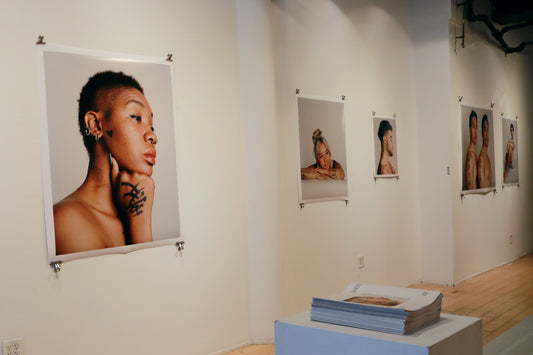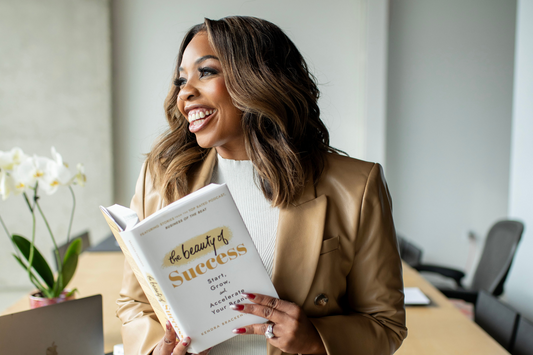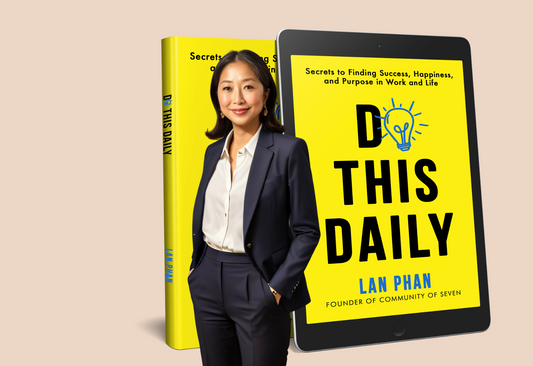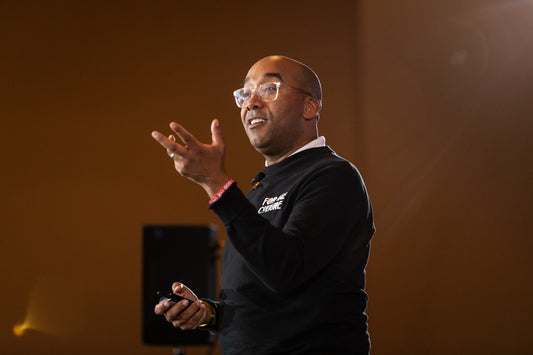An artist and designer who grew up in Japan before making a home for herself in the US, Connie Makita has spent her career leaving her creative mark on brands like Uniqlo and J.Crew and at companies immersed in culture, like Nylon Magazine and Atlantic Records. Her journey has taken her from a teenaged immigrant adjusting and acclimating in a new country to a successful leader with a striking eye for design that delivers depth and emotion. Her new exhibition Ai Means Love: Stories of Japanese Tattoos on Non-Japanese Bodies displayed in collaboration with New York’s All Street Gallery captures the stories of several people who have used themselves as the canvas for their own art – and in the process have woven a cross-cultural tapestry that is as American as it can be.
In this Q&A, Connie shares her definition of community, what inspired the show, and the best advice she’s ever received.
Wellth: What’s your superpower – what sets you apart compared to others?
I’m very unfiltered. I innately have that approach to how I build relationships with people. I’m also very decisive. I believe this skill is something that I’ve perhaps gained over the years of working in corporate America in graphic design/art direction. I don’t get swayed by other people’s opinions, and once I decide on something, I won’t second guess it or look back in regret. These two things not only ring true in my everyday life as a person, but they’re also reflected in my art.
Wellth: What inspired Ai Means Love?
My grandfather was a member of the Yakuza. He had a full body tattoo of traditional Japanese designed snakes and a missing big toe that he most likely self-sacrificed when he retired. As a kid, I never really questioned the tattoos or the missing toe – he always told me a rock fell on it while hiking. He passed away when I was 12 years old, and my entire block was lined up with Yakuzas in suits at his funeral. I remember that’s when I started questioning my mom about the whole thing.
Japanese society has an interesting relationship with tattoos. Because of their historical association to the Yakuzas, tattoos are most commonly frowned upon and famously banned in public baths and pools. In stark contrast to life in America, almost 30% of the entire U.S. population have at least one tattoo. I personally do not have one, out of respect to my grandfather, but I was always mesmerized by the culture of it. The commonly seen “Asian tattoos” on American people always gave me a sense of a somewhat distorted misinterpretation of us – initially I was almost offended by it, especially if the letters were wrong or had poor penmanship. Subsequently, I had this realization that English is misused in Japan all the time – we are all collectively fascinated by cultures beyond ourselves, and that itself should undeniably be celebrated.
I’m continuously interested in the relationship between race, identity, and cross-culture narratives in America. This personal history of tattoos and my life in NYC as a Japanese artist inspired this project.

Wellth: You’ve said “America is a documentary”. How so – what do you mean by that?
Despite its obvious challenges, America is a captivating world of co-existing dimensions, as opposed to the homogenous landscape of Japan. Where I grew up in Yokohama, Japan, society runs in a cookie-cutter mold. It’s a beautiful place where people follow rules and respect each other, but sometimes it feels quite monotonous. By contrast, in a single subway car [in New York City, you can find] a blind Chinese grandma accompanied by a Jamaican caretaker, a group of Latino students, an Indian man reading a book, a European tourist couple, a rich white lady with expensive bags [and more].
Wellth: What do you hope visitors will take away from the show/exhibit?
The concept of cultural appreciation v. appropriation is something I’m constantly trying to materialize in my work. I always found this topic so interesting in a country where there's a complex history of racial disparity, but simultaneously existing on a constant mix and evolution of different nationalities. The title of my show might initially spark interest to assume that I may be calling out people for cultural appropriation, [but that] is the complete opposite of my intention. We all appropriate in some way or another and most often don’t even realize it, yet there is a hypersensitivity to “ownership” of culture today. I want to encourage thinking that’s less finger-pointing at each other, and to instead celebrate stepping beyond your own culture to explore, learn, and appreciate from others.
I also want to share the perspective that’s undeniably simple – we all deserve to tell our story. Every single person walking around the streets right now, sitting across from you on the train, we’re all journaling through life. We are all main characters of our own movie. I’m truly inspired by other people’s lives, and I hope it inspires others too.
Wellth: What’s the best piece of advice you’ve ever received, and how has it impacted your life and career?
There is a philosophical concept about purposeful behavior taught by the philosopher Alfred Adler. He explains that we all intentionally create reasons to tell ourselves we are not capable of doing something. We blame external factors and our past trauma purposely to protect our fear of failure, defeat, or rejection. I had this realization that I was doing exactly that. I can’t be an artist, because I need stable income. I can’t move to another country because it’s too much work. I am an introvert because I grew up as an only child. The Adler way of thinking really pushed me to understand that anything is possible if you control your mind to have courage, because essentially the past doesn’t matter – anybody can change and life is simple.
Wellth: How do you define “community” and what does it mean to you?
I think community is a place where one finds a sense of belonging with a larger group of people. However, for me, the idea of a community is somewhat complex because I have the typical third culture kid dilemma where I constantly feel out of place. I also tend to value relationships on a more intimate level, so in a sense that’s my own interpretation of “community.” I don’t place myself in a community in a conventional sense but have true curiosity to someone that has a different perspective or unique set of knowledge that I can learn from.
Wellth: What is one thing you do for your own health and wellbeing?
I go to the sauna! It’s a great way to digitally detox and relax my mind.






